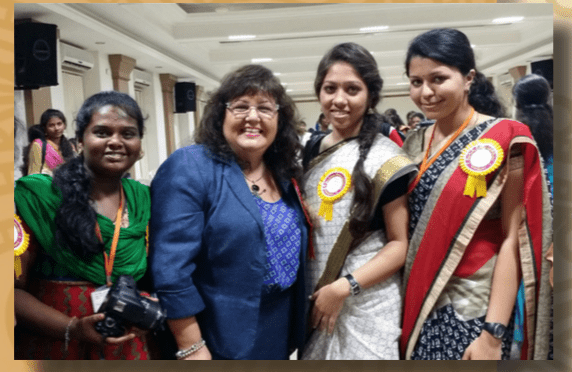UCF Director Gives Keynote Address at Indian Conference

By: Dr. M. C. Santana, Director of Women’s Studies, UCF’s College of Arts and Humanities.
I was privileged to give the keynote address at the Media, Youth and Values Conference at Holy Cross College, Tiruchirappalli, India on Nov. 27-28, 2014.
Ceremony and protocol are imperative in India in events such as this one. The formality gave an air of rigorous welcoming to the pedagogical exchange taking place. Higher education is not perceived in the same way it is in the U.S., but with greater expectations of etiquette. The students, graduate and undergraduates were very engaged in the discussions, and you could see their faces full of devoted attention. The enthusiasm was obvious, even after the first long day of the conference.
The diverse content of the presentations provided an outlet for three important themes: media coverage of issues and their influence on young people; young people’s promise of responsibilities; and the ethics of creating mass media messages. With a Ph.D. in international communication, I wanted to discuss the importance of reading and having visual literacy on messages (commercial, political or news-oriented) and how it relates to the individual. Coming from the West and a highly individualistic society, my challenge was to talk with an audience that mostly had a collective perspective. My speech was entitled “Creating the Whole Individual,” and it proposed the importance of allowing young people to lead and create content that speaks to them, while at the same time understanding the great implications of a message seen and heard by millions. Opening with “the communication revolution is no longer a revolution; it has, in fact reached a state of maturity,” I began to elaborate on the usual digital and technological changes we encounter globally today and how these changes are now part of our everyday lives and nation/state infrastructures. As UCF’s Women’s Studies director, I also addressed a most vital topic for me: gender. Gender analysis constitutes an accepted and growing part of international relations inquiry and a significant international policy tool.
I was reminded of those words throughout the conference when speaker after speaker quoted part of my remarks. I was humbled by this experience. After attending and planning many conferences, I can truly say that this experience was unique. It was different for many reasons. The level of involvement of the student body was especially impressive.
The academic diversity of topics presented by scholars and some graduate students ranged from identity formation in Facebook selfies; young people’s interpretation of news reports on violence against women in India; television advertising and learning; smartphone interfaces; student attitudes on social media; the pressure to be perfect; and the cultivation of body image in television. I was able to connect with scholars, administrators of different levels and faculty on topics like film, visual communication and policy making. It was also a great opportunity to share UCF’s story.
In summary, India is magnificent; its natural beauty is overpowering and beautiful. The people live a hard life, but one full of dignity. Society seems to be centered in the collective mentality of family as the strongest force. I hope you consider visiting India, and experiencing all the diversity it has to offer. Finally, I would like to acknowledge and thank the steering committee — Dr. J. Josephine, Dr. V. Sunderaj and Dr. P. Govindaraju — for its generous support and invitation to visit India and Holy Cross College.
